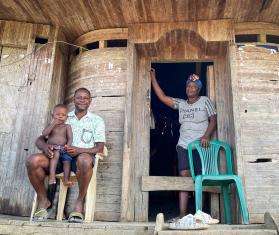Untreated, sleeping sickness inevitably kills after inflicting horrible pain and sometimes insanity. Spread by tsetse flies, this dreaded tropical disease claims more than 55,000 lives per year in 36 African nations. Our volunteers refuse to let this disease continue to kill in silence.
Profile of a Killer
African Trypanosomiasis, or sleeping sickness, is an extremely painful and debilitating disease. Left untreated, it always kills its victims. It is caused by two different types of parasitic protozoans, Trypansooma gambiense and Trypanosoma rhodesiense, transmitted by infected tsetse flies.
There are two distinct stages in the evolution of sleeping sickness:
Stage One - Trypanosomes are present in the blood causing blood and circulatory system disorders. Symptoms include fever, intense headaches, and anemia.
Stage Two - The neurological system is affected. Victims suffer disturbed sleep patterns, are extremely lethargic, and eventually slip into a coma and die.
Angola: The choice to die or undergo painful treatment
MSF volunteer Rebecca Golden recently returned from Angola, where a desperate battle against sleeping sickness is being waged after years of war have wrecked that nation's health care system. Says Golden, "There are many instances of my mission that I will remember, but one in particular was visiting the town of N'Dalatando in Angola's northern province, Kwanza Norte, where our teams are working with victims of sleeping sickness," says Rebecca. "I visited the hospital, where the only treatment available is administered by MSF.
"The treatment is a form of Arsenic and is extremely painful. I was visiting some children receiving their medicine and was amazed at their courage and strength. When the arsenic entered their bloodstream, they curled their toes, turned their heads, and closed their eyes tightly. Their choice was to die or take the treatment. They accepted it with such calm. After 20 years of war and lost family members, they seem to accept this as just another part of the survival process.I think my memories of this dilapidated hospital with no water, electricity, or even enough beds — full of innocent children suffering from sleeping sickness — will be permanently fixed in my mind."
Before Angola's long civil war, there were only a few known cases of sleeping sickness in the country. It was virtually eradicated. Now we have 100 to 200 new cases arriving per week. The war resulted in the breakdown of the national health system and caused the people fleeing the fighting to come in contact with swarms of tsetse flies.



